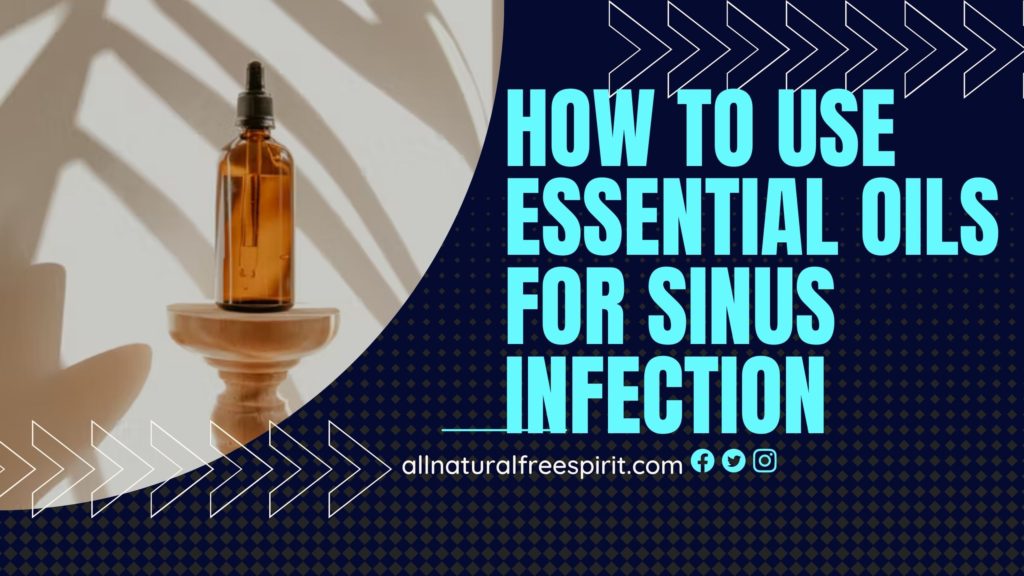The pollen season is here, and if you’re one of the unlucky ones who always seem to get a sinus infection, you’ll want to read this! Sinus infections can be very uncomfortable and even painful.
Especially when the pressure builds up, and you can’t breathe through your nose.
But did you know that certain essential oils can help relieve sinus congestion and infection? Nobody likes taking medication, especially if it’s something you can try to cure naturally.
Essential oils are a great way to treat a sinus infection. They’re natural, don’t have any side effects, and are very effective.
There are a few different ways to use essential oils for a sinus infection. This blog post will go over the different ways of how to use essential oils for sinus infections and which oils are the most effective.
What Causes Sinus Infections?

Sinus Infection, also referred to as Sinusitis, is an infection or inflammation of the sinuses.
Sinuses are cavities in the skull that are lined with mucous membranes. Sinus infections can be caused by a virus, bacteria, or fungus.
They can also be caused by allergies, environmental irritants, or a deviated septum. Over 10 million people in the US suffer from sinus infections every year.
It is estimated that roughly $1 billion is spent on treatments for sinus infections each year.
The symptoms of a sinus infection can vary depending on the cause of the infection. But generally, the symptoms include:
- Congestion
- Runny nose
- Facial pain/pressure
- Post-nasal drip
- Fever
If you have a sinus infection, it’s important to seek treatment as soon as possible. If left untreated, a sinus infection can lead to serious health complications.
Yes, conventional remedies like over-the-counter medication or antibiotics can help, but they come with their own set of side effects.
That’s where essential oils come in! Essential oils are a great way to treat a sinus infection naturally. There are a few different ways on how to use essential oils for a sinus infection.
Read: How to make lemon oil for skin lightening at home

How To Use Essential Oils For Sinus Infection
Essential Oils are natural oils that are extracted from plants. These oils are known for their therapeutic properties. Essential oils can treat a variety of illnesses and conditions, including sinus infections.
There are a few different ways you can use essential oils for sinus infection:
1. Inhalation
Inhalation is one of the most effective ways to use essential oils for a sinus infection.
Inhalation allows the essential oil to enter the lungs and bloodstream, which can then be distributed throughout the body. This is a great way to get relief from a sinus infection quickly.
There are a few ways you can inhale essential oils:
- Diffuser:A diffuser is a device that disperses essential oils into the air. This is a great way to get relief from congestion and pressure.
- Steam Inhalation:You can add a few drops of essential oil to a pot of boiling water. Lean over the pot and drape a towel over your head to trap in the steam. Inhale the steam for 10 minutes.
- Hot Compress:Add a few drops of essential oil to a bowl of hot water. Dip a cloth into the water and apply it to your face.
Read: How can you tell if essential oils have gone bad
2. Topical Application
Essential oils can also be applied topically to the skin. This is a great way to get relief from facial pain and pressure. It will give you a cooling sensation and help to clear congestion.
Just be sure to do a patch test first to make sure you’re not allergic to the oil.
To use essential oils topically:
- Dilute the essential oil with a carrier oil like coconut oil or jojoba oil. Apply the mixture to the skin.
- Add a few drops of essential oil to a bowl of hot water. Dip a cloth into the water and apply it to your face.
3. Internal consumption
Some essential oils can also be taken internally to help treat a sinus infection. This is a great way to get relief from congestion and pressure. But be sure to consult with a health professional before taking essential oils internally.
To take essential oils internally:
- Add a few drops of essential oil to a glass of water. Drink the water.
- Take a few drops of essential oil in a veggie capsule. Swallow the capsule with water.
Read: How to make perfume last longer on skin
4. Combination Therapy
Sometimes it’s helpful to use a combination of different essential oils to treat a sinus infection. You can combine different oils to create your own personal blend.
A good combination can really work wonders to clear up a sinus infection.
You just need to figure out which essential oils work best for you. It is important to do your research and consult with a health professional before using essential oils for sinus infections.
Read: How to make air freshener last longer
Frequently Asked Questions on essential oils
Can you put essential oils in your nose?
Essential oils should not be put in the nose. Inhalation is the best way to use essential oils for a sinus infection. You can always add a few drops of essential oil to a diffuser or use a steam inhalation method.
How long does it take for essential oils to work?
A: It depends on the person. Some people may see results immediately, while others may need to use essential oils for a few days before seeing any improvement. Plus, everyone responds differently to essential oils. So, it’s important to find what works best for you.
How often can you use essential oils?
You can use essential oils as often as needed. Just be sure to follow the instructions on the label and consult with a health professional if you have any questions. Don’t overuse essential oils, as this can lead to skin irritation.
What are the side effects of using essential oils?
Essential oils are generally safe for most people. But, some people may experience minor side effects like skin irritation or headaches. If you have any concerns, be sure to consult with a health professional before using essential oils.
There you have it! Everything you need to know on how to use essential oils for sinus infections. Essentials oils can be a great way to get relief from congestion and pressure.
Just be sure to do your research and consult with a health professional before using essential oils. They can help you figure out which oils work best for you.

